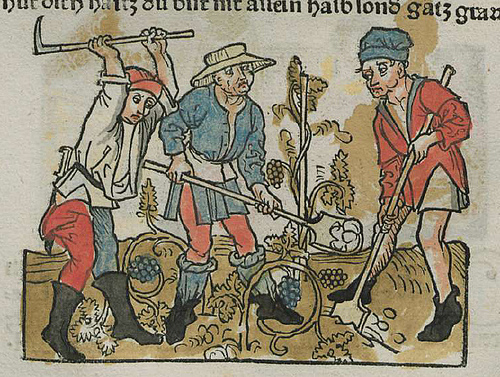Friday Fable. La Fontaine’s “The Ploughman and his Sons”*
|
|

Caption: A hand colored Steinhowel illustration. University of Munich
“The farmer's patient care and toil
Are oftener wanting than the soil._
A wealthy ploughman drawing near his end,
Call'd in his sons apart from every friend,
And said, "When of your sire bereft,
The heritage our fathers left
Guard well, nor sell a single field.
A treasure in it is conceal'd:
The place, precisely, I don't know,
But industry will serve to show.
The harvest past,
Time's forelock take,
And search with plough, and spade, and rake;
Turn over every inch of sod,
Nor leave unsearch'd a single clod."
The father died.
The sons--and not in vain--
Turn'd o'er the soil, and o'er again;
That year their acres bore
More grain than e'er before.
Though hidden money found they none,
Yet had their father wisely done,
To show by such a measure,
That toil itself is treasure.”
Is the notion of work as treasure merely quaint? In an age of connectivity, of electronic entertainment and diversion for every waking minute, of never being “alone”, of endless sessions with Angry Birds or other games, the idea of digging in a field may not be among your favorite apps. But, that is to miss the point.
An assigned reading** in my Democratic Workplace class is about Taoism, the philosophy with the quirky conundrums, like this one:
“Shape clay into a vessel; It is the space within that makes it useful. Cut doors and windows for a room; It is the holes which make it useful. …. Usefulness comes from what is not there.”
Another one is “Practice non-action. Work without doing.” I’ll ask the class to suggest what that means. “What is ‘real work’ to the Taoist?”
We know there is drudgery, a type of work that appears to accomplishes little if anything. Fortunately, there is another kind of work, the real thing, that challenges us enough to keep our interest and focus on alert. We may even achieve a sort of “flow” in doing interesting work. And sometimes, we have to pass through the drudgery to come out with a renewed appreciation for work. The sage farmer tricks his sons into working and they learn about the benefits of hard work, of caring for your resources, of having the daily discipline to work and stay on task. Tricked our not, they are the better for it.
*Source: "A Hundred Fables of La Fontaine" by Jean de La Fontaine, London; New York: John Lane Co., 1900
** Marshall, Peter. “Taoism and Buddhism” excerpted from his book, Demanding the Impossible: A History of Anarchism, London: HarperCollins, 1992. Pp. 53-60. Please note this excerpt only discusses Taoism. For further background read: “The best leader leads least.”
 John Lubans - portrait by WSJ
John Lubans - portrait by WSJ